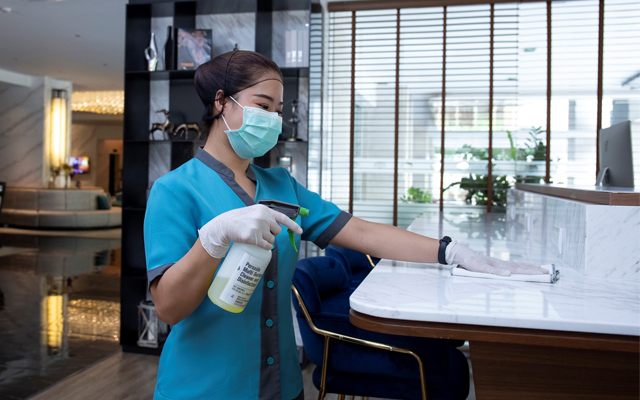In the hotel industry, a hallmark of hospitality is being able to welcome and care for one’s guests as if they were family. In present times, amid the Covid-19 pandemic, that promise of care and concern becomes all the more critical for business continuity.
High standards of hygiene and cleanliness are now the baseline in service, and consumers look to health and safety protection to regain their travel confidence.

Marc Steinmeyer, president director of Tauzia Hotel Management in Indonesia, said that while hotels typically abide by high standards of cleanliness, an enhanced approach is now needed to “give guests greater ease of mind”.
But in the quest to establish the ultimate safe environment for cautious guests, could hoteliers risk compromising the warmth of hospitality and become too sterile for their own good?
Fransiska Handoko, government relations director with the Bali Hotels Association (BHA), thinks so.
“It is important to strike a balance,” said Fransiska. “We do not want to become sterile and turn Bali into a ‘hospital’ destination.”
Norbert Vas, vice president of business development, Archipelago International also warned against joining the “clean wars” among hotel today.
“There is the tendency for hotels to overemphasise the new normal hygiene standards in their advertising and promotional activities instead of focusing on their intrinsic qualities. Some hotels are competing to be the cleanest one of all. This is silly and will not help the industry,” he remarked.
Instead, he suggested that hotel marketing focus on reassuring travellers and reminding them of the many good things that travel brings.
Over at Pan Pacific Hotels Group, health and safety messages are presented differently. While it rolled out its Pan Pacific Cares promise, which emphasises a commitment to ensuring the safety and well-being of its guests and staff, the company has chosen to focus on the community outreach part of the programme.
CEO Choe Peng Sum said: “I am so proud of Pan Pacific Cares, and we take it very seriously. (Health and safety messaging) is important but it is overdone. You look up and you see every hotel group has their own programme. It is now a given, no more an advantage.
“(By focusing on Pan Pacific Cares’ community work) we want our customers to understand that with our ability to care for the community, the environment and our staff (even in challenging times), we can be trusted to take good care of them too.”
Besides being careful with messaging, hoteliers also advised against going overboard with technology replacements even as contactless standards are sought.
Craig Bond, executive vice president, operations, ONYX Hospitality Group, said: “We believe in deploying technologies and systems to empower our team members, not to replace them, as hospitality is a people-driven business.”
Bond cited wai, the traditional Thai greeting with palms clasped at the chest and with a slight bow, as an example of how warmth and welcome can still be conveyed without physical contact.
“We are seeing wai replacing handshakes in many countries, and we are glad that this uniquely Thai cultural export is offering some relief to our friends worldwide during this pandemic. Our team members have over time figured out a way to smile through their masks, offering acknowledgement, assurance and a sense of comfort to our guests through that subtle sparkle in their eyes,” he added.
Vas said told TTG Asia that “beautiful menus and personal conversations with waiters are being replaced by QR codes, while self-check-in and check-out are becoming more popular”. But beyond these changes, Vas sees no place for robotic replacements in the service line, saying that “people will get annoyed” once the novelty wears off. – Additional reporting by Karen Yue




















